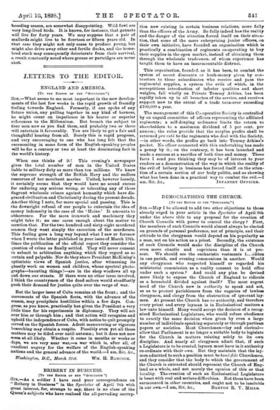DEMOCRATISING THE CHURCH.
[TO THE EDITOR OF THE "SPECTATOR."1
SIR.—May I be allowed to add two other objections to those already urged in your article in the Spectator of April 9th under the above title to any proposal for the creation of Church Councils with power to control the clergy ? First, the members of such Councils would almost always be elected on grounds of personal preference, not of principle, and their attitude to the clergyman would depend on his popularity as a man, not on his action as a priest. Secondly, the existence of such Councils would make the discipline of the Church even more chaotic and capricious than it is at pre- sent. We should see the eucharistic vestments f,,,Jidden in one parish, and evening communions in another. Would any clergyman who respected himself or regarded his ministerial commission as a reality consent to hold office under such a system ? And could any plan be devised more likely to expose the Church of England to ridicule as a household divided against itself ? The most urgent need of the Church now is authority to speak and act, so as to protect parishioners from the vagaries of lawless clergymen, and clergy from the obstruction of ignorant lay- men. At present the Church has no authority, and therefore every priest and every layman is in Ecclesiastical matters a law unto himself. Many would accept the decision of a recog- nised Ecclesiastical Legislature, who would refuse obedience to exactly the same decision when given by even a large number of individuals speaking separately or through partisan papers or societies. Most Churchmen—lay and clerical— allow that Parliament is no longer a suitable body to legislate for the Church in matters relating solely to its own discipline. And nearly all clergymen admit that, if such a Legislature is to be created, laymen must have in it authority co-ordinate with their own. But they maintain that the lay- men admitted to such a position must be bona fideChurchmen, and they consider that the body to which the government of the Church is entrusted should represent the Church of Eng- land as a whole, and not merely the opinion of this or that locality. The creation of such an Ecclesiastical Legislature is beset with real and serious difficulties. But these have been surmounted in other countries, and ought not to be insoluble


































 Previous page
Previous page